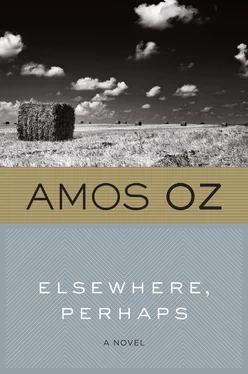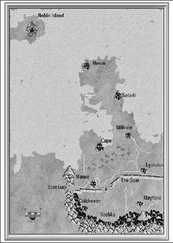Sometimes they met by chance, in the dining hall or on one of the lawns. They nodded to one another and looked away. Strangers. Not embarrassed, not bitter, just strangers. Surprisingly enough, Noga, attentive though she was to her own body, hardly associated her baby with Ezra Berger. Ezra had walked out of her thoughts. Noga saw the thickset, coarse-featured truck driver, and as she did so she felt as if he… as if the man were familiar from somewhere else. It was as if her mind's eye were blinded. It was not that she had forgotten the facts. But the connections between the facts had ceased to exist.
Something similar had happened to Ezra. Sometimes he sat at the table in the evening and read aloud from the Bible in a colorless voice, shuddering suddenly at an outburst of mad howling from the jackals and asking himself, what did I do, when was I, ages ago I was. But he tried to skirt it. To isolate himself from it. Get back to the Bible. Sometimes he inflicted on his memory a protracted, minutely detailed torture. To his surprise he discovered that memories were wearing rather than painful. The memories were disintegrating into heaps of words that did not belong, that had no life, that… had no connection.
This is not easy to understand. We had thought they were in love. But no. Perhaps they were using one another. Perhaps — hard though it is to say it — perhaps Noga and Ezra had been holding onto one another as one holds onto an instrument or a weapon. Now, with the goal achieved, the tool had dropped from the tired hand, and all that was left was the urge to rest.
Slowly, as if with great weariness, Ezra came back. There were moments when Bronka dreamed of a dramatic reconciliation. She suppressed her dream. It seemed that there was a deep truth in the words spoken by Ezra to Podolski: I'm tired. I haven't got the strength of stones. I'm tired.
Bronka did not set her course out of weariness. There were still times when she missed Reuven. With determination she snapped the thread. Her eyes were opened. She saw how far. And she was a strong woman.
The scars turned pink, then gray, then faded. Perhaps because Ezra and Bronka had never hated one another. Even during the bitter days there had been a dim, whispering sympathy between them. Only they had been remote from one another. Now they had come back to each other because they had an urgent need to lean. They leaned.
One day Siegfried pinched Einav's cheek and whispered gleefully:
"Look at them, my lovely, look at those two old lovebirds. He's reading the Bible to her; she's taken off her glasses and is looking at his lips; they're both relaxed; it's a real honeymoon. She's taken him under her wing and become his mother and his sister, as our national poet puts it. Hm?"
There was a certain amount of truth in the visitor's remark, even if it was exaggerated and full of lascivious glee. There was no honeymoon. But there was — we use the term with some hesitation — a brotherly feeling. There were still long intervening hours of gray, dreary silence. It seemed as though they would last right up to the end. The big, clumsy clock would go on ticking. If they did not take care to turn the tap off properly, it would go on noisily dripping.
Zechariah had an idea. To invite his family out for a friendly evening together, somewhere pleasant, somewhere else. The change of air and the intimacy would be a balm for worn-out feelings.
He ordered a taxi to take them to Tiberias at eight o'clock, after supper and little Danny's bedtime. They were a full taxiload: the elder Bergers and the younger Bergers, the guest playing the host for the evening, and, at Ezra's request, Grisha Isarov too. Ezra and Grisha had become close friends recently. Three or four evenings a week they sat together in Grisha's room, playing dominoes or chess. Grisha told wonderful stories, and Ezra summarized the morals of the stories in Biblical verses taken out of context.
Zechariah wore a dark suit and a flower in his buttonhole. Ezra and Tomer were in white open-necked shirts. Grisha — for a change — put on a pair of shorts that displayed an enormous pair of hairy legs. Einav, for her part, wore the low-cut dress that she reserved for special outings.
They started the evening with a couple of hours in the bar of a large hotel by the Sea of Galilee. There was a small orchestra. Grisha twirled his mustache and bawled his orders at a cowering waiter.
Zechariah bowed to Einav and invited her onto the blue-lit dance floor. The saxophone was laughing and crying. Einav leaned on Zechariah's shoulder and felt a new woman. They danced together for a long time, while Bronka and Tomer glared at them angrily, though each for a different reason. Zechariah attracted admiring glances. He danced effortlessly but with amazing precision. Painted tourist women tried to lure him with smiles, but he remained faithful to his beloved Einav. Her face was radiant, and her limp had disappeared.
Ezra and Grisha engaged in a good-humored drinking contest. Zechariah, in the brief intervals between dances, outdrank them both and made fun of them, although — needless to say — his jokes never exceeded the bounds of friendly good manners. The drink did not get the better of him.
But Ezra and Grisha were carried away by the change of scene and the drinks. Around midnight they burst into spirited song, attracting the cheerful attention of the other occupants of the bar.
Tomer, who was not a drinker and was not fond of the old songs, said nothing, but glowered furiously at his wife's legs. Bronka followed his glance and announced that she was tired. Reluctantly, the others acceded and rose to leave. The wealthiest member of the party, of course, settled the bill.
They strolled for a while by the lakeside. Grisha and Ezra strode ahead, arm in arm, conversing hoarsely. Then came Zechariah and Einav, he with his arm round her waist. Bronka and her son meekly brought up the rear.
It was a warm, clear night, with a full moon. The water rippled and flashed. The outline of the mountains showed opposite. The lights of the town shone yellow. A breeze was blowing. Grisha and Ezra exchanged memories of the good old pioneering days. Bronka intruded an occasional remark. Zechariah described to Einav the latest European fashions. A subdued quarrel brewed up between Einav and Tomer, but they controlled themselves so as not to disrupt the cheerful mood of the evening. Zechariah and Grisha argued about an incident in the fighting in the Western Desert during the Second World War. On logical grounds Zechariah was right. Grisha produced a crushing retort: I was there and I saw it with my own eyes.
Zechariah gave in with a sigh:
"Conclusive proof. You win."
Grisha was delighted.
Eventually, they turned toward the main street of Tiberias in search of a taxi. Suddenly a voice assailed them from behind:
"Hey, Ezra, what's up with you, then — here you are and you don't look in and see us?"
"Gershon Saragosti!" Ezra exclaimed.
They were all forced to go to Abushdid's together. Ezra introduced his friends to his family and his family to his friends, and they were welcomed with coffee, the like of which was not to be found anywhere else in Tiberias. Coffee that was as black as night and as strong as iron, as Yosef Babadjani put it.
"What's up, Ezra?" Kabilio asked in amazement. "Where's your daughter, your lovely daughter, what a lovely daughter, where is she, why haven't you brought her with you? She's not ill, heaven forbid?"
Ezra grabbed Kabilio's elbow and whispered:
"Shut up Kabilio."
Kabilio's eyes opened wide. He looked at Ezra as though he did not understand. Then at once he understood. His expression changed; he let out a long breath, winked at Ezra, and whispered with a grin:
"Of course. I see. Now I see. I won't breathe a word. Your wife… and that sweetie you said was your daughter… I see. Of course I'll shut up. Like a clam I'll shut up. You can trust me."
Читать дальше












